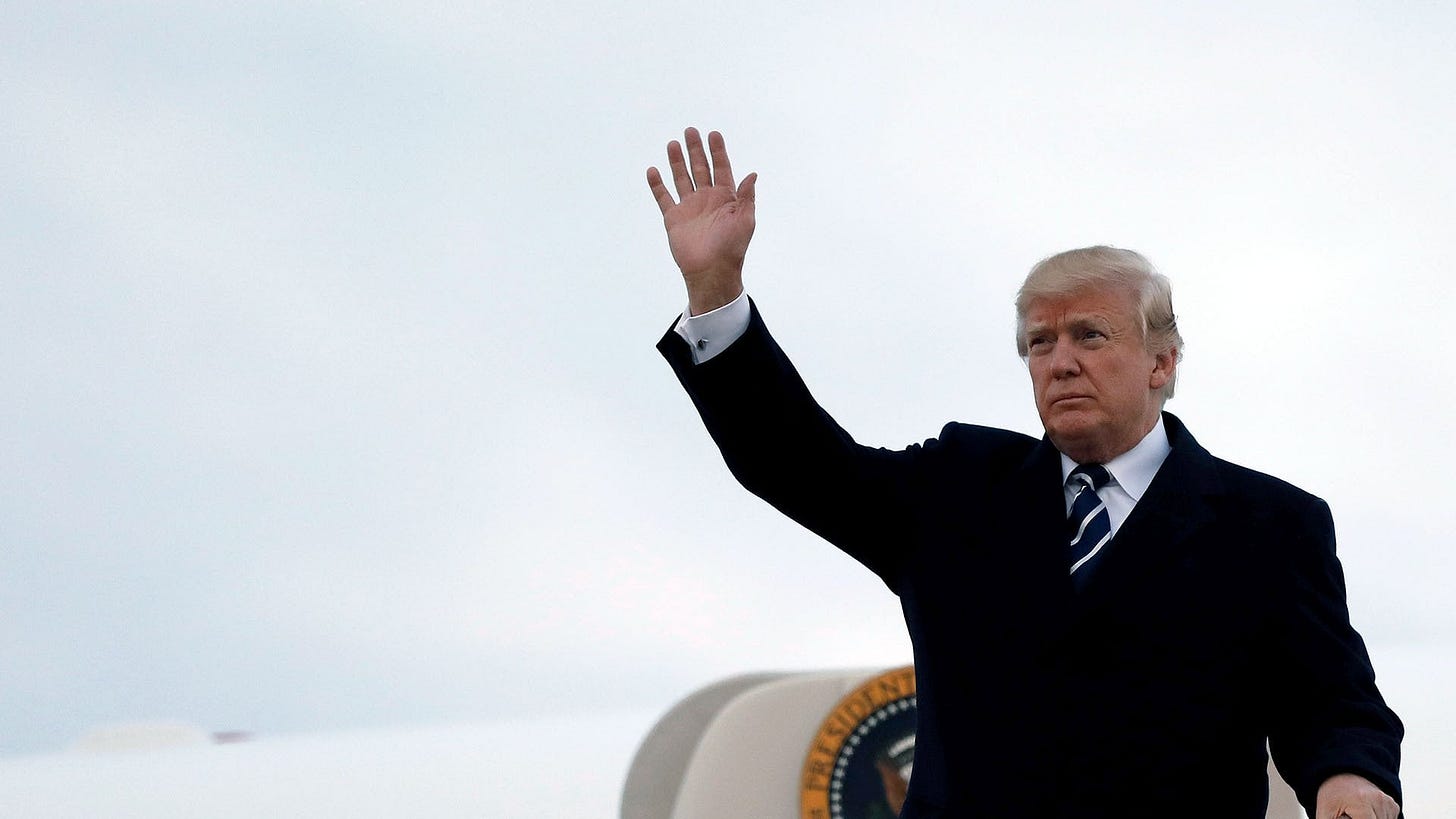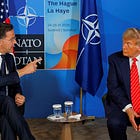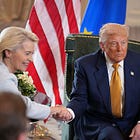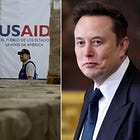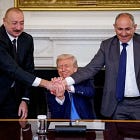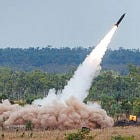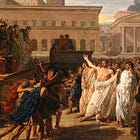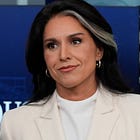Daddy’s Home: Trump’s "Transactional" Foreign Policy Is Anything But Retreat
The critics cry “isolationism,” but Trump is making the U.S. more dominant than ever — by turning dependent allies into strong partners.
This essay is free, but with Premium Membership you get MORE. Join today.
by Rod D. Martin
August 13, 2025
When NATO Secretary General Mark Rutte joked at this year’s summit that the alliance needed “Daddy” Trump back, it was more than an icebreaker. It was an unguarded confession: Europe knows exactly who set it straight.
What it wasn’t was the unending “America is withdrawing from the world” refrain of our neoconservative friends.
Rutte, a Dutch globalist to his bones, knew exactly who had dragged NATO out of decades of complacency, who had forced Europe to stop coasting on American protection and start taking its own defense seriously. He was acknowledging, in public, that the man so often accused of undermining NATO had in fact saved it from irrelevance.
Trump casts his foreign policy as “Commerce Not Chaos”, and that’s certainly the positive side of it. But the negative, necessary side could be better summed up as “Partners Not Dependents”.
For decades following the Cold War, America’s relationship with much of the developed world has resembled a dysfunctional household. We were the responsible but indulgent parent, working two jobs, paying all the bills, and fighting off the burglars, while our grown children — perfectly capable, wealthy in their own right — offered sanctimonious lectures from our basement, spent lavishly on domestic luxuries, and quietly undercut us in trade and diplomacy.
This was called “alliance.” In reality, it was dependency. Europe was content, giddy really, to sneer at American boorishness while outsourcing its defense to us, effectively a subsidy of the German welfare state while for lack of rifles Germany trained its soldiers with broomsticks, and bought its energy from its supposed geopolitical nemesis.
The foreign policy establishment in Washington was fine with that. Occasionally they scolded a bit, or sent a “strongly worded letter”. But they were terrified of “what might happen” if they expected more from the grown children in the basement. They convinced themselves that this lopsided arrangement was “leadership,” that anything else would mean “abandonment” or “retreat.” And they took overweening pride in being “essential”.
It would be easy at this point to say something like “everyone but the American people benefited.” But even that’s not true. How does weakness serve Europe’s interests? And how does it serve America’s? Has dependence on Moscow for energy made Europe more able to carry out its economic sanctions against its frenemy? Has dependence on Washington made it better able to arm its ostensible Ukrainian ally?
If Europe feels threatened by Russia, or anyone, isn’t that because Europe couldn’t fight off a gang of armed teenagers (literally, as it turns out)? And exactly whose fault is that?
Donald Trump never bought into that fiction. Unlike the childless European elite, Trump has raised five impressive children, each capable and accomplished in their own right. He knows what that cost. He also knows what we can all plainly see: that his family is stronger as a result, that the whole is greater than the sum of the parts. He could have let his kids play video games while the butler brought them beer. Instead, he made them learn every part of the business they now masterfully run.
He also knows those principles apply to more than just family.
The keepers of the Uniparty foreign policy consensus recoiled in horror. But the results speak for themselves. Despite the hysterical screeching to the contrary (and from people who ought to know better), Trump’s foreign policy is not a retreat from the world. In fact, it’s the exact opposite: a commitment to doubling allied defense expenditures (including ours), creating vastly more forces with which to confront all threats, combined with a leveling of the playing field in trade and investment that interconnects nations more than ever before: “Commerce Not Chaos”.
That’s not “withdrawing”. It’s leadership of the sort we haven’t seen since Reagan, of a growing community aligned not by moralizing but by interest. Far from “withdrawing from the world”, Trump is asserting American hegemony.
Hegemony is an interesting word, frequently confused with empire. Empire means rule, over unrepresented people by a foreign elite in some distant capital. Hegemony is none of that. Hegemony is alliance, in which one of the allies is significantly stronger than the rest.
Now you can certainly have alliances without hegemony: any grouping of equals is exactly that. But the United States is no one’s equal. It is 4% of the world’s population yet 26% of the world’s economy. And that’s not because it “stole”, or “got lucky”: that’s because it’s the most productive, most innovative, most entrepreneurial nation in human history. America is, as it were, exceptional. In so being, it’s also a beacon of hope, an inspiration to better, and a magnet for millions who want a better future.
America is larger than life. It cannot help but have outsized influence in any club it might join. Its hegemony is inevitable. But unlike an imperial master, whether of the traditional sort or of the modern globalist variety, a hegemon respects boundaries: each nation is free to rule itself, and does so, even while voluntarily acting in the collective interest.
This is another way of saying that where empire is inherently anti-nationalist, hegemony affirms nationalism: the idea that discrete groups of people should have the right to rule themselves, not be ruled by others in Brussels, Berlin, or Beijing. Partnership is one thing, colonization is quite another, whether literal or metaphorical.
Trump’s project is explicitly nationalist. It starts with “America First”, but it doesn’t stop there. And that’s what truly horrifies many of Trump’s critics. His vision of strong partner states reduces the very dependency that made them all subjects of the preferred globalist, elitist order.
Ironically, in so doing, Trump has enhanced and extended America’s global hegemony more than any President since Reagan. “First among equals” means more when the others really have some measure of equality. America isn’t retreating: if you don’t believe me, ask yourself who bombed Fordow, or why the Kansas National Guard is in former Russian ally Armenia this morning?
No: America is deputizing its allies to take more responsibility in their own regions, allowing America to bring overwhelming force to bear anywhere at any time, without danger of Bush-Obama era overstretch.
This may be “transactional”, but it isn’t isolationism. It just isn’t neoconservatism. It’s the restoration of a model that worked under Reagan — a model of moral realism and hegemony, not imperial arrogance and overreach.
By respecting, affirming, and strengthening sovereignty, demanding responsibility, and recognizing the limits of American power long ignored by the Uniparty establishment, Trump has ensured those limits will not be reached. Indeed, by empowering partners he has expanded those limits. In doing so, he has extended America’s influence and spread its ideals farther than his recent predecessors ever could.
The people who cry “retreat” understand this on some level. They just don’t like it. The Beltway class thrives on dependency. NGOs, defense contractors, and diplomatic bureaucracies all profit from client states who can’t — or won’t — stand on their own. Moreover, as DOGE discovered at USAID, the entire system has become corrupt, a giant leftist slush fund for unaccountable off-books projects both foreign and domestic.
Trump threatens that business model. By ending the subsidies and demanding performance, he strips the establishment he inherited of its influence and relevance. So they call it “isolationism.” People who for the most part don’t believe in Capitalism denigrate it as “transactional”. But their real fear isn’t that America will disengage — it’s that it will engage in ways they can’t control or monetize. And even worse still: it’s that an increasingly potent partnership of strong, assertive nation-states will prove fatal to the globalist project.
Trump’s foreign policy is not “withdrawal from the world”, or “isolationism”, no matter how many learned hands tell us otherwise. The father who makes his sons work, train, and contribute doesn’t abandon them — he prepares them to stand with him in a fight. That’s what Trump has done for his own family, and it’s what he’s doing for America’s allies. In the process, he has only increased American hegemony.
Daddy’s home.



